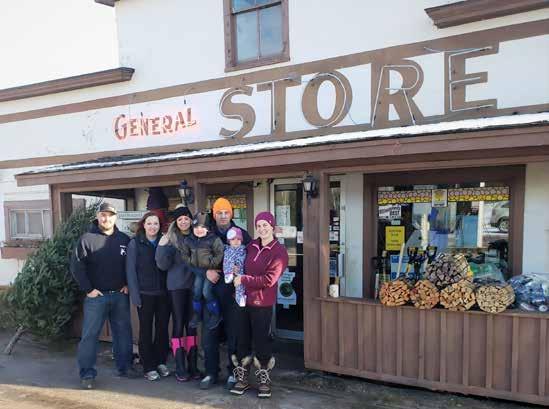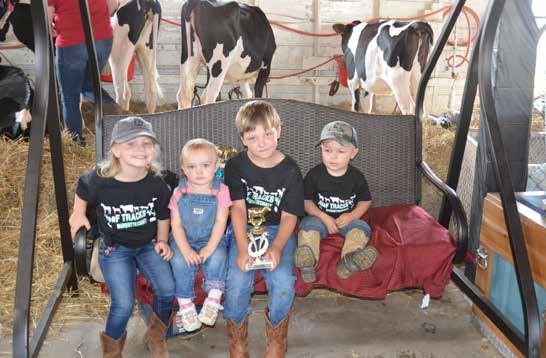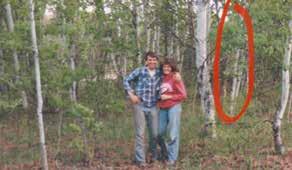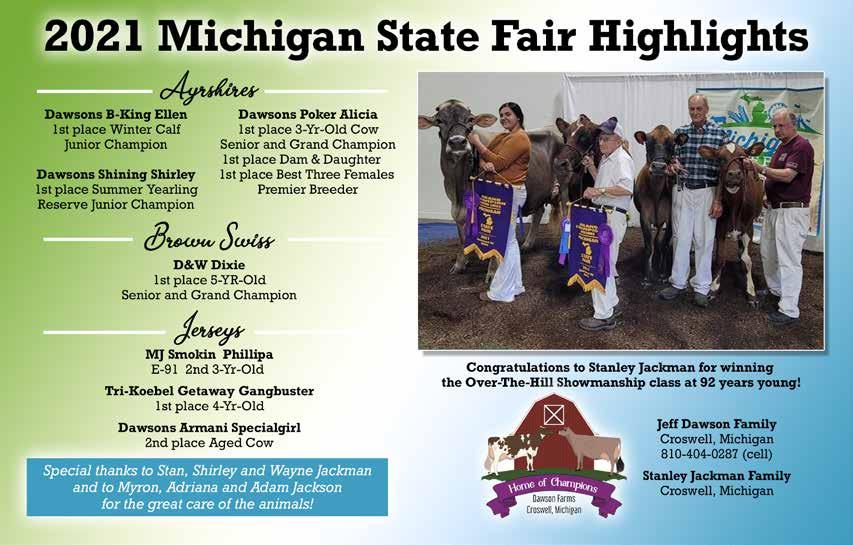
4 minute read
Upper Peninsula Dairy Breeds Success Through Adversity, Diversity
By Bev Berens

The fourth generation of DeVooght farmers in the making, enjoying ife at the fair.
(photo provided)
It’s a 15-mile drive to work a field, spread manure or check growing crops - that’s the reality of farming near Marquette, Mich., for the DeVooght family.
“There just isn’t a lot of good land nearby - a lot of it is wooded, and being so close to Marquette, a lot of it is developed,” said Olivia DeVooght, herd manager for the farm.
The family opted to diversify their dairy operation so all five member families could make a living from their Upper Peninsula (UP) farm. Along with milking 65 cows on two robots, the DeVooghts farm more than 1,500 acres of crops, hay, maple syrup, produce, beef, pork, lamb and pulling horses. In 2017, the family purchased a nearby gas station, growing it into a hub for selling their farm-grown produce, meat, hay and straw and feed, and as an outlet for other market gardeners in the area who provide seasonal produce for sale. “The gas station literally created two full-time positions for my younger sister Emily, who runs the station, and my brother Charles, who sells a lot of meat and produce,” said Olivia. The location about 10 miles outside the popular tourist town on Highway 41 sees plenty of traffic. “We keep gas as cheap as possible and draw people in for the produce and other products.” Olivia and her brother, Owen, are both full-time with cows and crops; their parents, Bill and Mary, are everywhere as needed. The milking herd is about 20 percent registered Holsteins, most of which belong to Olivia - including her first registered female she purchased from Hardy’s Holsteins, now a 15-year-old cow enjoying retirement while carrying yet another calf in a 10-acre pasture at her and husband Craig Maraccini’s home. “Most of my registered animals go back to her in some way,” Olivia said.
The DeVooght siblings pause in front of their General Store and Farm/Feed supplies/gas station during one of the busiest holiday weekends of the summer. Pictured from left are Owen, Olivia, Emily, Charles and his wife Miriam, along with their two children Nash and Ali.
In 2019, the family was milking 120140 cows when the freestall barn collapsed from snow load. Fourteen feet of snow fell that winter, and the DeVooght family spent 21 consecutive days shoveling snow from the barn roof in February - unfortunately, in vain. The cows were distributed to farms in Menominee County where they were milked for six months by other dairy farmers. The robots were left exposed for the rest of the winter and would later need refurbishing.
“We had to decide to either keep milking, further diversify or whatever,” Olivia said.
They decided to continue with the dairy but downsize, retaining their best 50 females and 20 springers. As the nearest farm to Jilbert Dairy, the UP’s only major milk bottler, it was advantageous for everyone to rebuild. The freestall barn was rebuilt, and the robots were both moved into a space with in-floor heat and other preventative measures to keep the equipment working as best possible through severe cold, yet not discourage cow entry to the robots.
Bill and Mary DeVooght purchased their first 80 acres in the late 1980s. The land was entirely wooded, and the couple cleared half the property with horses. The bought a sawmill to cut the wood and built the dairy barn with their own lumber. They began milking just six cows and shipped the first load in 1989.
Bill personally prefers cross-breeding cattle to obtain a smaller-framed, hardier cow, using Jersey and Ayrshire sires. Producing a cow that eats less, breeds back quickly and has a long productive life opens opportunity for selling extra heifers.
“We don’t push our cows, and feed for about 65 pounds of production,” Olivia said. “Most of our cows are in their seventh through ninth lactations and still going strong.”
The family could choose to feed for higher production, but every decision must be made according to resource availability. There is a large-animal vet locally, but no one who treats dairy cattle. “Basically, we have no vet to turn to for emergencies. If I need a vet, I have to trailer the animal a couple hours away,” she said. “The cows really need to be self-sufficient.”
Bulls are used over artificial insemination because no stud services make regular route stops to the area. “We actually have to call and request someone to stop,” Olivia said. They have used several Hardy’s Holsteins bulls, including a red-and-white son of Elmwood, and a Jasper son. Owen recently learned to A.I. and did his first insemination using a Select Sires bull.
The farm runs newer equipment, as parts are three or more hours away in Wisconsin or downstate Michigan. Emergency service calls result in excessive downtime, which can’t be lost during the area’s short growing season.
Olivia and Craig, who is a millwright, have a 16-month-old daughter, Hazel, who represents the fourth generation of this family of UP farmers.

Bill and Mary shortly after purchasing their first 80 acres. The circled birch remains at the
center of the farm today. (photo provided)











